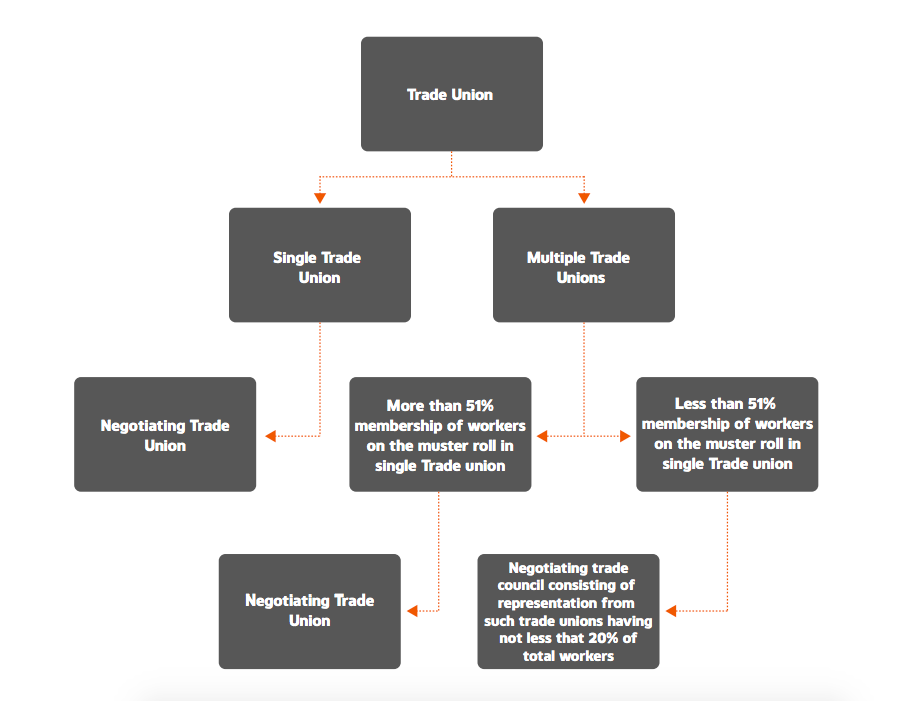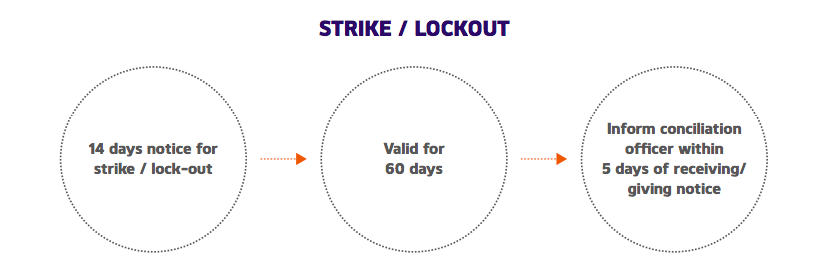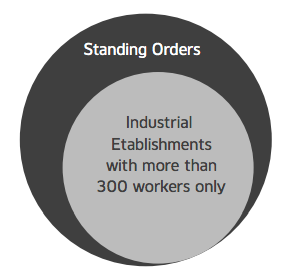Introduction:
The Industrial Relations Code, 2020 (“IRC 20”) has been introduced as a part of the labour legislations consolidations, in terms of the recommendation of the Second National Commission on Labour (2002).Accepting their recommendations, the Ministry of Labour and Employment has consolidated labour code in to four labour codes of
- (i) Industrial Relations
- (ii) Wages
- (iii) Social Security
- (iv) Welfare and Safety.
The IRC 20 consolidates and amends the laws relating to Trade Unions, conditions of employment in industrial establishment or undertaking, investigation and settlement of industrial disputes and for matters connected therewith or incidental thereto. It governs important aspects of the employer-employee relationship such as working conditions, collective bargaining, re-skilling etc.
While the Wages Code, 2019 was passed by the parliament in 2019, the Industrial Relations Code, along with the two other codes on social security and safety, were referred to the Standing Committee. Upon incorporating changes suggested by the Standing Committee, the Industrial Relations Code, 2020 was introduced and passed by the Parliament[1]. The IRC 20 is yet to receive assent of the President of India.
Laws subsumed:
- The Trade Unions Act, 1926.
- the Industrial Employment (Standing Orders) Act, 1946; and
- the Industrial Disputes Act, 1947.
Salient features:
- The definition of “Worker” has been revised to include persons in supervisory capacity getting wages up to eighteen thousand rupees per month.
- Concept of “Re-skilling fund” has been introduced.
- Registered trade unions may be recognised by the Centre/State as Centre/State trade unions as per necessity.
- Concept of Negotiating Trade Union and Negotiating Trade Councils has been introduced to streamline negotiations with the employer.
- The definition of “Strike” includes casual leave taken by more than fifty per cent of the employees on a given day. Trade union have to give notice of 14 days before going on strike.
- Provisions with respect to Standing Orders apply to Industrial Establishments with more than 300 employees only.
- Establishment with less 300 workmen can be layed-off, retrenched, closed without government approval.
- An industrial disputes can be voluntarily referred to arbitration by the employer as well as the workers

1. Trade Unions:
Negotiating union or negotiating council
- The IRC 20 provides for a new concept of negotiating union or negotiating council in an industrial establishment. As per the said provision:?
- In case of a single trade union in an industrial establishment, the employer shall recognise the said union as the sole negotiating union of the workers.
- In case of multiple trade unions, the trade union with 51% membership of workers on the muster roll of the industrial establishment shall be recognised as the negotiating union by the employer.
- In case of multiple trade unions, with none meeting the above 51% membership criteria, the employer shall constitute a negotiating council, consisting of representatives of such registered trade unions, which have support of not less that 20% of total workers of the industrial establishment (1 representative for each 20%).
- The IRC 20 also provides that in case the Central/State Government is of the opinion that it is necessary for a Trade Union or a federation of Trade Union to be recognised as a Central/State Trade Union, the respective government may the recognise said trade unions as the same.

2. Strikes & Lockouts:
- The IRC 20 defines “Strike” to include the concerted casual leaves on a given day by fifty per cent or more workers employed in an industry.
- No person employed can go on a strike without giving a 14 days’ notice to an employer before a strike. This notice shall be valid for a maximum of 60 days.
- Similarly, no employer can lock-out any of its workers without giving a 14 days’ notice of a lock-out. This notice shall be valid for a maximum of 60 days.
- Further, IRC 20 prohibits strikes and lock-outs: (i) during and up to seven days after a conciliation proceeding, and (ii) during and up to sixty days after proceedings before a tribunal or an arbitrator (iii) during any period in which a settlement or an award is in operation.
- Employers are required to report to the appropriate government and conciliation officer, within five days from receiving/giving notice of a strike/lock-out.

3. Standing Orders:
- IRC 20 provides that the provisions with respect to standing orders shall apply to establishments having had three hundred or more employees on any day of the preceding twelve months.

- An employer shall be required to prepare the draft standing orders, basis the model standing order of the Central Government, within 6 months from the date of commencement of the code in consultation with the recognised negotiating unions or members of the negotiation council with respect to the same. The same shall be certified by the certifying officer.
4. Re-skilling Fund
- IRC 20 provides for setting up of a “Re-skilling fund” for the employees retrenched from the industrial establishment by the employer.
- The fund shall consist of the following amounts:
- Contribution of the employer, equivalent to 15 days wages as last drawn by the worker immediately before being retrenched.
- Contributions from other sources as maybe prescribed.
- The fund must be utilized for paying 15 days wages last drawn by the worker, to his account, within 45 days of the worker being retrenched.
5. Lay-off and retrenchment
- IRC 20 defines lay-off as the inability of an employer, due to shortage of coal, or power, material or breakdown of machinery, accumulation of material or natural calamity from giving employment to a worker whose name is on the muster roll and has not been retrenched.
- Retrenchment refers to the termination of service of a workman for any reason other than disciplinary action. It does not include retirement, non-renewal of contract, or completion of tenure of fixed term employment or termination on the ground of continued ill- health.
- The provisions on lay-off and retrenchment under IRC 20 do not apply to industrial establishments with less than 50 workers on an average per working day or to seasonal industrial establishments.
- Employers are required to give to every worker who has completed at least one year of continuous service, : (i) 50% of basic wages and dearness allowance if he is laid off, and (ii) one month’s notice (or equivalent wages) and 15 days’ wages for every year of continuous service for such period to a worker who has been retrenched.
- Further, factories, mines and plantation, which have three hundred or more workers must take prior permission of the appropriate Government before lay-off, retrenchment and closure.
6. Power of Government to reject or modify tribunal awards
- IRC 20 provides the Government can defer the enforcement of awards passed by the Tribunals in certain circumstances on public grounds of affecting national economy or social justice.
- The Industrial Disputes Act, 1947 had similar provisions. In 2011, the Madras High Court (affirming a 1997 Andhra Pradesh High Court judgement) struck down these provisions on constitutional grounds and held that the power to the executive to decline enforcing an award or to modify it, allows the executive to sit in appeal over the decision of the Tribunal, and therefore, violates the separation of powers between the executive and the judiciary, which forms a part of the basic structure of the Constitution.
7. Grievance Redressal Mechanism
- IRC 20 provides that every industrial establishment employing more than 20 employees must have one or more grievance redressal committees for resolution of disputes arising out of individual grievances.
- The committee should consist of equal number of members representing the employers and workers and the chairperson shall be chosen, alternatively from the employees and workers on rotational basis every year.
- The number of Grievance Redressal committees cannot exceed 10 and there must be adequate representation of women workers in the said committee and should not be less than the proportion of women employed in the industrial establishment.
Disputes relating to termination of individual worker:
- IRC 20 classifies any dispute in relation to discharge, dismissal, retrenchment, or otherwise termination of the services of an individual worker to be an industrial dispute. The worker may apply to the Industrial Tribunal for adjudication of the dispute. The worker may apply to the Tribunal 45 days after the application for the conciliation of the dispute was made.
8. Disputes Relating to Termination of Individual Worker
IRC 20 classifies any dispute in relation to discharge, dismissal, retrenchment, or otherwise termination of the services of an individual worker to be an industrial dispute. The worker may apply to the Industrial Tribunal for adjudication of the dispute. The worker may apply to the Tribunal 45 days after the application for the conciliation of the dispute was made.
DISPUTE RESOLUTION MECHANISM
Bi Partite Forums
Industrial Establishment having 100 or more workers may be required to constitute a works committee consisting of employers and workers for securing and preserving good relations between employer and employees.
Arbitration
Industrial disputes may be referred to arbitration on mutual consent.
Resolution of Industrial Disputes
Appointment of Conciliation officers by the appropriate government
Industrial Tribunals
National Industrial Tribunals for settlement of industrial disputes which: (i) involve questions of national importance, or (ii) could impact industrial establishments situated in more than one state. Members of the National Tribunal will include: (i) a Judicial Member, who has been a High Court Judge, and (ii) an Administrative Member, who has been a Secretary in the central government.
Penalties
| OFFENCES
|
CHANGES
|
| Penalty for unfair labour practice |
Rs. 10 thousand to Rs. 2 lakhs. |
| Penalty for committing unfair labour practice after conviction |
Rs. 50 thousand to Rs. 5 lakhs and/or imprisonment upto 3 months. |
| Penalty for contravention of provisions on lay off, retrenchment or closure. |
Rs. 1 lakh to Rs. 10 lakhs. |
| Penalty on contravening the provisions of lay off, retrenchment and closure after conviction once |
Fine of Rs. 5 lakhs to Rs. 20 lakhs and/or imprisonment upto 6 months. |
|
Penalty in case of violation of:
a. Rights of workers laid off for compensation
b. Conditions for retrenchment of workers
c. Compensation to workers in case of transfer of establishment
d. Compensation to workers in case of closing down of industry
|
Fine of Rs. 50 thousand to Rs. 2 lakhs |
|
Penalty in case of violation after conviction of:
a. Rights of workers laid off for compensation
b. Conditions for retrenchment of workers
c. Compensation to workers in case of transfer of establishment
d. Compensation to workers in case of closing down of industry
|
Fine of Rs. 1 lakh to Rs. 5 lakhs and/or imprisonment upto 6 months. |
- [1] Lok Sabha passed the IRC 20 on 22 September, 2020 and Rajya Sabha passed the said code on 23 September, 2020.
















